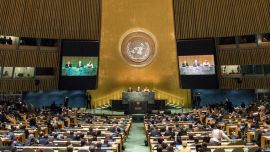The International Monetary Fund (IMF) has eased Argentina’s net reserves accumulation target for the year by US$1.8 billion, making a concession to the government and its warnings of the negative impact of a punishing drought on export earnings.
The new target for 2023 is US$8 billion, down from the previously agreed US$9.8 billion, said the Fund in a report that admitted that the risks facing Argentina’s US$44.5-billion debt deal “are now higher due to less favourable economic conditions.”
This move “reflects the impact of the drought,” which is estimated at over US$5 billion, said the Fund in its latest quarterly review of the deal.
Reserves targets will also change for each quarter of the year, lowering the bar for Argentina to pass future reviews, though the adjustment will be weighted towards early 2023. The end of first quarter target, for example, has been lowered to US$1.9 billion in the wake of the poor harvest.
“The cumulative target through end-2024 remains unchanged at US$15 billion, given the drought’s assumed temporary impact,” said the Fund.
Net reserves, or the stockpile of cash at the Central Bank, are seen as crucial to preventing a major currency devaluation.
The agency's board noted in its report of Argentina’s 2022 Extended Fund Facility (EFF) deal that "meeting the quarterly targets will require significant policy efforts.”
In the report, the IMF says that Argentina's agricultural exports and foreign exchange inflows could be reduced due to the drought. It would therefore have "negative implications for growth, reserves, inflation and fiscal balances.”
Warning that higher inflation and lower growth could “fuel social discontent and undermine support for the programme, particularly given the electoral cycle,” officials from the multilateral lender cautioned that “programme implementation risks remain very elevated” due to Argentina’s “complex domestic economic, social, and political situation.”
In response, the IMF called for “contingency planning and agile policy making” to improve the EFF deal’s chances of success, such as “additional policy tightening and FX policy adjustments.”
In another section of the document, the IMF criticises a recent pension moratorium that received congressional approval, saying it creates “liabilities of around 0.4 percent of GDP over the medium-term, for which additional policy measures will be required to mitigate the impact and maintain the programmed fiscal adjustment path.”
Acknowledging that the quarterly review approved waivers of non-observance on selected policies, the Fund also called for the timely removal of capital flow measures, multiple currency practices and exchange restrictions,” describing them as “no substitute for sound macroeconomic policy.”
This implies a higher freer exchange rate and fewer impediments to trade or Central Bank interventions into the markets.
On the domestic front, the IMF called for the “prudent” management of rollover risks and said Central Bank interventions into secondary bond markets should be limited.
"Real interest rates should remain sufficiently positive to address high inflation and support demand for peso assets," the report added. “Further rate increases may be warranted in the event of further inflation shocks or intensification of FX pressures.”
"The rate of crawl should continue to support competitiveness, with recent actions to rationalise the FX regime and boost exports also helping to support reserve accumulation,” the Fund’s officials concluded.
The report was published a few days after the Fund’s executive board signed off on the review, in turn approving disbursement of US$5.3 billion to Argentina.
Including this latest tranche, the country has received US$28.9 billion since the start of the programme in March 2022.
– TIMES




















Comments